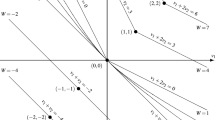Summary.
A social welfare function for a denumerable society satisfies Pairwise Computability if for each pair (x,y) of alternatives, there exists an algorithm that can decide from any description of each profile on {x,y} whether the society prefers x to y. I prove that if a social welfare function satisfying Unanimity and Independence also satisfies Pairwise Computability, then it is dictatorial. This result severely limits on practical grounds Fishburn's resolution (1970) of Arrow's impossibility. I also give an interpretation of a denumerable “society.”
Similar content being viewed by others
Author information
Authors and Affiliations
Additional information
Received: April 14, 1995; revised version August 29, 1996
Rights and permissions
About this article
Cite this article
Mihara, H. Arrow's Theorem and Turing computability. Economic Theory 10, 257–276 (1997). https://doi.org/10.1007/s001990050157
Issue Date:
DOI: https://doi.org/10.1007/s001990050157




